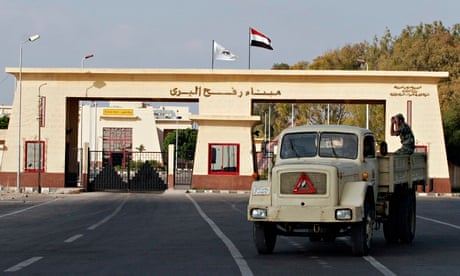It would be wrong to say that agreeing a ceasefire to end a month of fighting in the Gaza Strip is the easy bit. It is not, and the 72-hour truce could break down. Tackling the medium-term issues about Gaza, let alone the intractable longer-term ones at the heart of the Israeli-Palestinian conflict, will be even harder. Some of the issues on the table include:
Border crossings
Egypt's ceasefire proposal states: "Crossings shall be opened and the passage of persons and goods … shall be facilitated once the security situation becomes stable on the ground." The Palestinian side is demanding the Gaza blockade be lifted. It wants its offshore fishing zone extended to 12 miles from the three-mile boundary imposed since 2007, and the construction of a port and airport. Israel and Egypt agreed to ease the blockade after the last round of fighting, in 2012, but borders and imports of goods remained tightly controlled. Israel will now face international pressure to ease up, but it is unlikely to be willing to relax restrictions on building materials needed for reconstruction, given the quantity of concrete used to build Hamas's "terror tunnels". Third-party monitoring might help.
Controlling the borders
It has previously been mooted that control of Gaza's borders might be returned to the Palestinian Authority, which is backed by the west and based in Ramallah. The authority, which is headed by Mahmoud Abbas, ran the enclave before Hamas won elections in 2006. That implies security cooperation with Israel. Other possibilities include a role for the UN, though Israel is unlikely to agree to that. France has suggested the revival of the defunct EU border assistance mission. Egypt's behaviour since the anti-Islamist military overthrew Mohamed Morsi and cracked down on the Muslim Brotherhood suggests that Cairo will not allow new tunnels to be dug into Gaza from its side of the border.
Weapons and demilitarisation
Israel emphasises the need to destroy Gaza's tunnels and stockpiles of rockets. Its formula is "rehabilitation in exchange for demilitarisation". Egypt's ceasefire plan, however, does not discuss demilitarisation and it is hard to imagine Hamas agreeing to surrender its only deterrent – and its raison d'etre as the Islamic Resistance Movement. This is also true for Islamic Jihad and other factions.
Israel is likely to press for a weapons monitoring and disarmament role for Egypt and the Palestinian Authority, but will continue overt and covert efforts to interdict weapons and equipment. It is noteworthy that intelligence and security chiefs from the Palestinian Authority, Israel and Egypt are all involved in the Cairo ceasefire talks. "Every truck of cement entering Gaza from the Israeli side will be followed by a truck of rockets exiting the Strip [on] the Egyptian side," suggested a former Israeli official.
Prisoner releases
Hamas and the Palestinian Authority demand the release of two batches of Palestinian prisoners held by Israel: a final group left over from the failed talks brokered by the US between Israel and the authority, and another group who were set free in the 2011 Gilad Shalit deal and then rearrested in the wake of the June abduction and murder of three Israeli teenagers in the West Bank. Hamas and the other Palestinian factions do not appear to have any live or dead Israelis to swap, as they did in previous agreements.
Reconstruction and the economy
The Palestinians demand support for the reconstruction of Gaza with international finance. The enclave faces a $6bn (£3.5bn) bill to replace devastated infrastructure and build 100,000 new housing units. The Palestinian Authority is planning a donor conference in Norway next month, and Arab Gulf states such as Qatar are talking about paying up. The authority's coordinating role will avoid the problem of making cash contributions to Hamas, which is still listed as a terrorist organisation by the US, EU, UK and Israel.
Peace negotiations
No peace talks have been held between Israel and the Palestinians since the breakdown of John Kerry's nine-month effort in April, which foundered over Israeli settlement activity and prisoner releases. Israel's visceral hostility to Hamas is only likely to have hardened during this latest bout of fighting, and vice versa.
Optimists suggest that the Israeli prime minister, Binyamin Netanyahu, may now reconsider his opposition to the creation of a Palestinian Authority-Hamas consensus government, raising the possibility of movement back to negotiations. Optimists, however, are thin on the ground. "For Netanyahu it's all about using Abbas to vanquish Hamas, which is no more realistic a prospect than it was before," said Daniel Levy of the European Council on Foreign Relations. "If anything Hamas has been strengthened."
